
THE GENESIS
While researching the 2017 world orienteering day, Margaret stumbled across a South African based paddle orienteering event and thought – “we can do that”. The seed was planted but it needed a lot of effort to finally germinate.
THE EVOLUTION
Initially slated as a Newcastle Orienteering event for 20 people or so, we eventually decided to go a little bigger. A Facebook page was created and we threw around options before eventually settling on an event title. We then smugly congratulated ourselves on our fab choice – “Paddle Hunter”. This seemed perfect to us as it described everything about the event in an economical two words. You paddle, you hunt (checkpoints) and it was based in the Hunter region.
The fact that we didn’t have an Aquatic Event License (AEL) was brought to our attention by Andrew Haigh. This nearly sunk the project. After quite a few phone calls and emails it became apparent that Orienteering Australia currently had no public liability insurance for on-water activities and were unlikely to change that situation. You can orienteer on foot, riding a mountain bike, on ski’s and even in a wheelchair but not in any sort of boat. At that point we seemed dead in the water.
Dejected but not defeated we spent the next 18 months seeking other groups that might host our pet project. Local bush-walking and paddling clubs were approached but each time there was a stumbling block. It looked bleak and our enthusiasm was almost depleted when Margaret saw a Queensland paddle event. A rogaine! A paddlegaine! Why had we not thought of a paddlegaine before this? We had competed in many rogaines over the years and had even competed in a local rogaine that year. A quick call to Trevor Gollan revealed that NSW Rogaining were looking for a November “Surprise Event” and this was a perfect match. Finally our event had a home.
THE NAME CHANGE
Why did you change the snappy and descriptive “Paddle Hunter” for the much longer and unwieldy “Lake Macquarie Paddle and Promenade Rogaine”? The simple answer is money. We successfully applied for a generous grant from Lake Macquarie City and wanted to give them naming rights as recognition for their support – thanks LMC! We also thought the area covered by our AEL was a tad small and that unless there was a foot section some of the stronger competitors might finish too early – thus “Promenade” was added to this now six word title which would prove challenging in graphic design considerations.
THE PRACTICALITIES
It didn’t take too long for us to realise that we didn’t really have any idea how to set a water based event. Margaret owned a kayak but was only an occasional recreational paddler while I didn’t paddle at all and while we have decades of orienteering and rogaining experience, including setting and organising major events, all our activities to date had been land based. This was a different kettle of fish – were we in over our heads? How fast do paddlers go? Do we need safety boats? How do we go about applying for an AEL and getting over all the regulatory high jumps? Should it be a paddle event only or do we have land based checkpoints? Will the navigation be too easy for regular rogainers? What number of competitors should we expect and what will be their expectations of this event? Can we place checkpoint in the middle of the lake and if so how do we do so?
We did have one big similarity to bush events in that safety is paramount. We quickly reached the conclusion that Margaret and I cruising about in a little rented tinny pretending to be a safety boat wasn’t going to look too flash on our license application. We immediately contacted the Lake Macquarie section of the SES that had taken on safety boat roles at the Lion’s Club Paddlefest for a number of years. Our contact, Tom Mackel, was enthusiastic about our event and was very familiar with water based sports. This would give his team a fantastic opportunity to keep up their skill levels … they were on-board. We are sure their presence helped us get over the line in eventually acquiring our AEL and Tom offered a few free tips in regards to safety and aquatic issues.
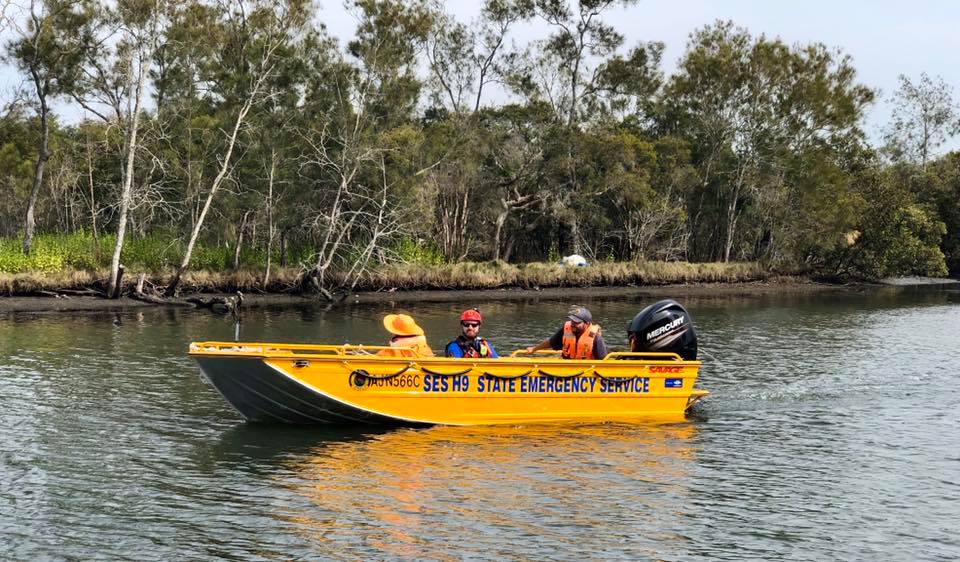
For the Queensland events double kayaks are provided (limited to 52) and the rental included in your entry fee. This seemed a good idea in that all participants are on an equal standing as far as their vessels are concerned. It became obvious that there were few companies with the capacity to provide enough kayaks and the one that did was already booked that day so we reverted back to BYO boat. We knew a few rogainers would like to participate but not actually own a paddle-craft so we contacted Lake Macquarie Kayak and Bike Hire and they were happy to be involved. We must thank Jennifer for taking this task off our hands and completely organising all the bookings – seems you had very happy customers.
THE PADDLE ADVISERS
Still worried by our lack of paddling credentials we asked around and were told that fellow local rogainers Rob and Marg Cook were extremely experienced and very successful paddle sports enthusiasts. I approached the pair and asked if they’d like to be our paddle advisers for this event. I might add that this conversation was while we were all purposely making our way to our initial checkpoint at this years 2019 Lake Macquarie Rogaine at Mulbring. They agreed, but on hindsight, a few checkpoints later, it occurred to me that possibly they’d only done so just to shut me up so that they could concentrate on the job and compass at hand. Not so, these guys were brilliant, constructive, professional (if you can be if not actually being paid) friendly and always willing to help. They pre-paddled our course to finally give us an idea of paddling times and were very encouraging about our course design and gave a glowing assessment of how much fun it was.
THE PROMENADE
We were given free rein as to how to present this event so long as paddling was a major component to fulfill our Surprise Event promise. We looked at a few different options. Paddle only? Paddle & Foot? Concurrent separate Paddle and Foot events. As mentioned above we ended up with a promenade section simply because we knew the fast competitors would complete the course too early without it. It also allowed regular rogainers that perhaps were not great paddlers to rest their arms for a while. Concurrent separate events would have seen a bigger entry list but this seemed a bit complex and we wanted to test the waters to see how a predominantly paddle event might fair (a week out we were concerned that the answer to that question was NOT GOOD). The addition of a promenade section added its own problems many of which were solved by utilising our transition checkpoints.
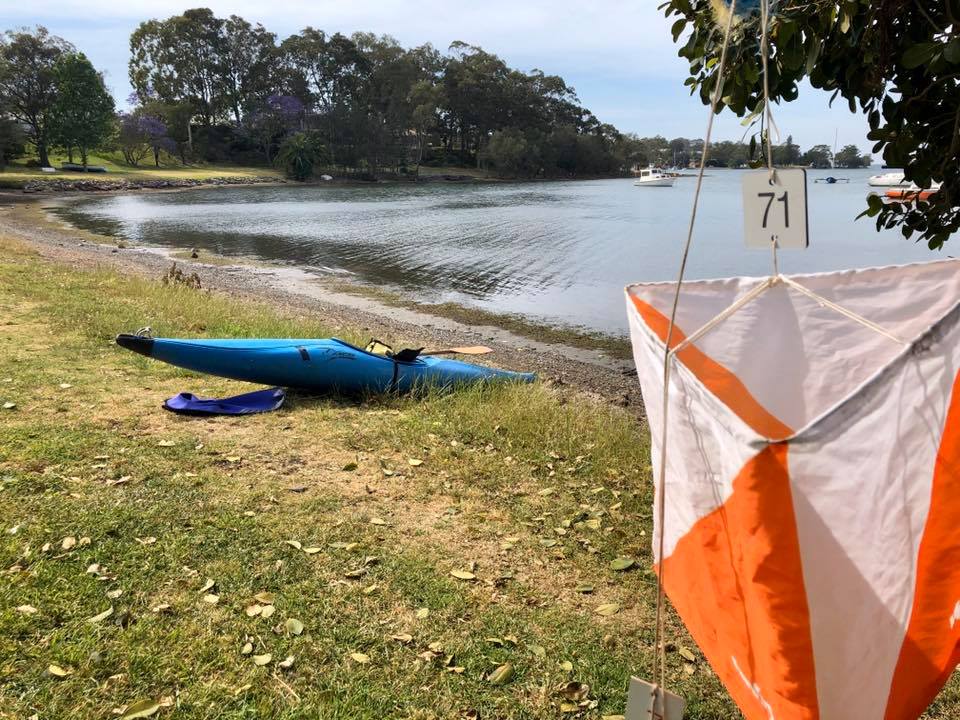
THE COURSE AND CHECKPOINTS
We were clever enough to select an area that offered easy road access to many places that might offer good checkpoint locations. There was of course some areas of the shoreline that were private property and unavailable. A quick ask around of a small group of fellow orienteers and rogainers at a social lunch provided access to the private jetty at CP 62 and to our event administrator Anita’s parents and sister place along L.T creek at CP 90. It’s amazing how there are hidden resources and contacts all around us just waiting to be discovered. Ideally for a paddle event you’d like to be able to paddle right up to a checkpoint, punch it and paddle off toward the next. How could we achieve this? Overhanging branches? We soon discovered that overhanging branches don’t grow on trees. Well yes, of course they do, but there were only a limited number that were of any practical use. We also realised that navigation itself would be too easy if you sighted the checkpoint out in the water as soon as you rounded the bend or could see it from across the bay. Some checkpoints would need to be land based – just a little way from the shoreline. Could we place checkpoints on water? How would we do that? One council throw-out day we drove around collecting boogie boards then over a few weeks designed, constructed and tested a prototype of a “floating checkpoint”. The “mast” needed to be easily detachable to allow them to be carried in a car. Our original idea of a brick to anchor them failed miserably – we needed real anchors. A google search revealed that new anchors were well over our budget but luckily Facebook Marketplace provided the answer providing 3 at around $10 each. We may have used more of these but our AEL only allowed us to use buoys provided they were placed after sunrise on the day of the event (and removed before sunset). There was no way we’d be able to place many of these and carry out other tasks on the morning of the event. Three was as many as we figured was possible. This task was delegated to Marg and Rob our paddle advisers. We also decided we could use star-picket posts driven into the lake bottom a few metres out but were worried their steel construction and narrow edges may damage vessels if you accidentally rammed it or moved up and down along side it due to the any wave action. Voilà– pool noodles. We had many other ideas some good, some bad, we were even going to hang CP 20 from the Fennell Bay bridge at one point in time. Eventually we settled for what we thought to be the best compromise as to what might be ideal and what was physically and logistically practical.
The Map can be found here
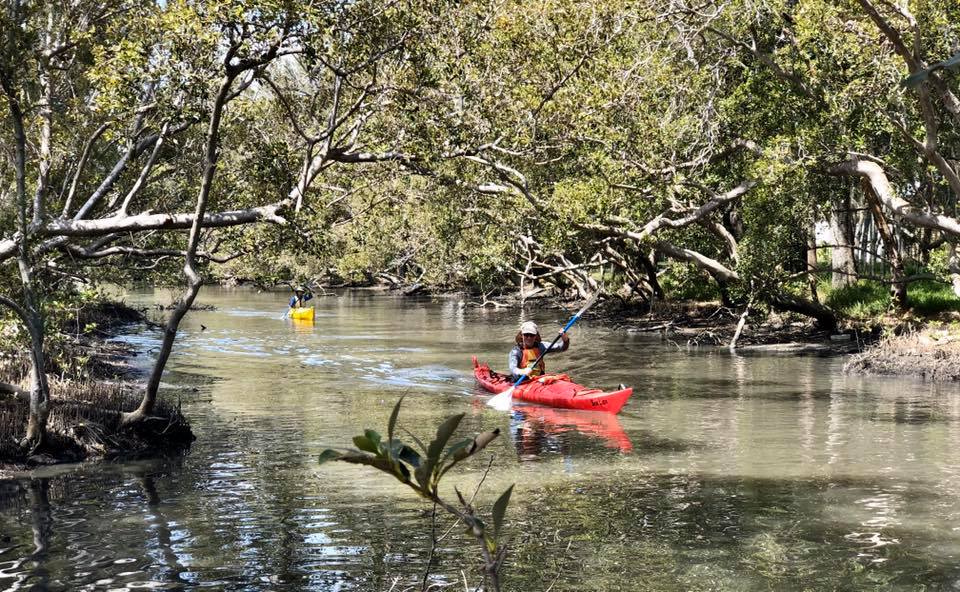
THE ENTRIES
Entries as usual began very slowly and continued to stay worryingly low even a few days out. “Everybody enters on the last day” we were told, but would they. Other events have historical data going back a number of years and can base their numbers on that. Paddy Pallin 400+, LMR 300+ etc. We had zero history to guide us. In the end after encouraging, cajoling and bullying as many people as we could, we ended up with very decent entry numbers of just below the 100 mark. We thank you all for supporting our event as it wouldn’t happen without participants. Unfortunately when trying to enter you were faced with an entry system that didn’t quite reflect the nature of this event. As rogaines are usually team based event, the page is geared up for teams entry. New rules now allow individual entries for events of 3 hour duration. We decided to have no teams but instead base it on the paddle-craft you were in. Either ”singles” or “doubles”. This was a bit of a square peg in a round hole situation and we apologise for the confusion. Purely our fault as this was difficult to convey to a group that has been trained to think of team configurations of 2-5 persons.
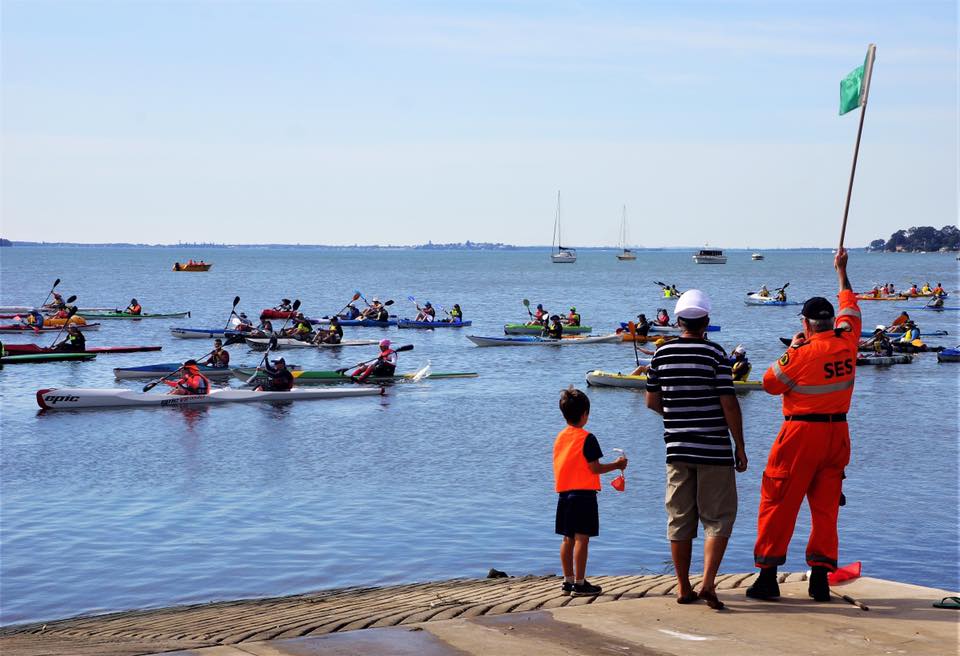
THE EVENT DAY
We were well organised and prepared and had wonderfully capable people supporting us but still had sleepless nights in the week leading up to this day. The realisation that our event with its two year gestation period was about to arrive and be presented to the rogaining world had us a little worried. Would it float or would it sink? Would the expected bad weather hold off until after we’d finished and packed up? Would lightning appear and force us to cancel the whole damn thing? Fortunately we woke up to a nice day and although the wind did increase at times during the 3 hours it was insignificant compared to the previous weekend which may have seen a postponement. The rain did eventually arrive but not until I was collecting the last checkpoint, CP 22. It was a water-based picket and I stopped for a while to watch the raindrops hitting the smooth water, creating a beautiful series of rings. As I stood there a flash of lightning reminded me I was standing knee deep in water with a 2.4 m metal rod conductor. Oops, time to leave.
THE TIME AND TIDE
Event dates tend to set themselves due to having to fit in with many competing elements. Sunday 3rd of November it was. The only tidal information available is at Swansea near the mouth of the Lake. By our observations is seemed to be two hours ahead of this northern section our event was to take place in. Many locals suggested that recent rain, air pressure, wind and weather conditions have a great affect on the water levels this far north. We’d visited the area on numerous occasions, many of these on a low tide. Tidal charts plus the estimated 2 hours suggested that we’d be around about low tide at the start of our event with an inflow during the event. Quite recently we had noted a very low tide, so low that it caused us to change our thinking considerably as to where we might place some checkpoints. Placing checkpoints on Saturday which had a low tide listed as 0.28 m (at Swansea) we observed it was nowhere near as low as the one we’d experienced a few weeks prior and our event low tide would actually be higher at 0.33 m. Phew, what a relief! Imagine then our horror turning up on the morning of the event to find the tide extremely low and still out-flowing. Half way through the event I saw a mud island that had appeared in Fennell Bay. Where had that come from? Checkpoints that on a normal high tide may be 2 metres from the water were now a staggering 50 metres walk. Wow – this must be a super low tide, our event is ruined. I took photos back from my drive around the course to show Margaret how bad it was. She was disappointed and dumbfounded. How can this be, given the tide charts and our previous observations, weren’t sea levels supposed to be rising? We’ll have to grin and bear it as there’s naught we can do about it.
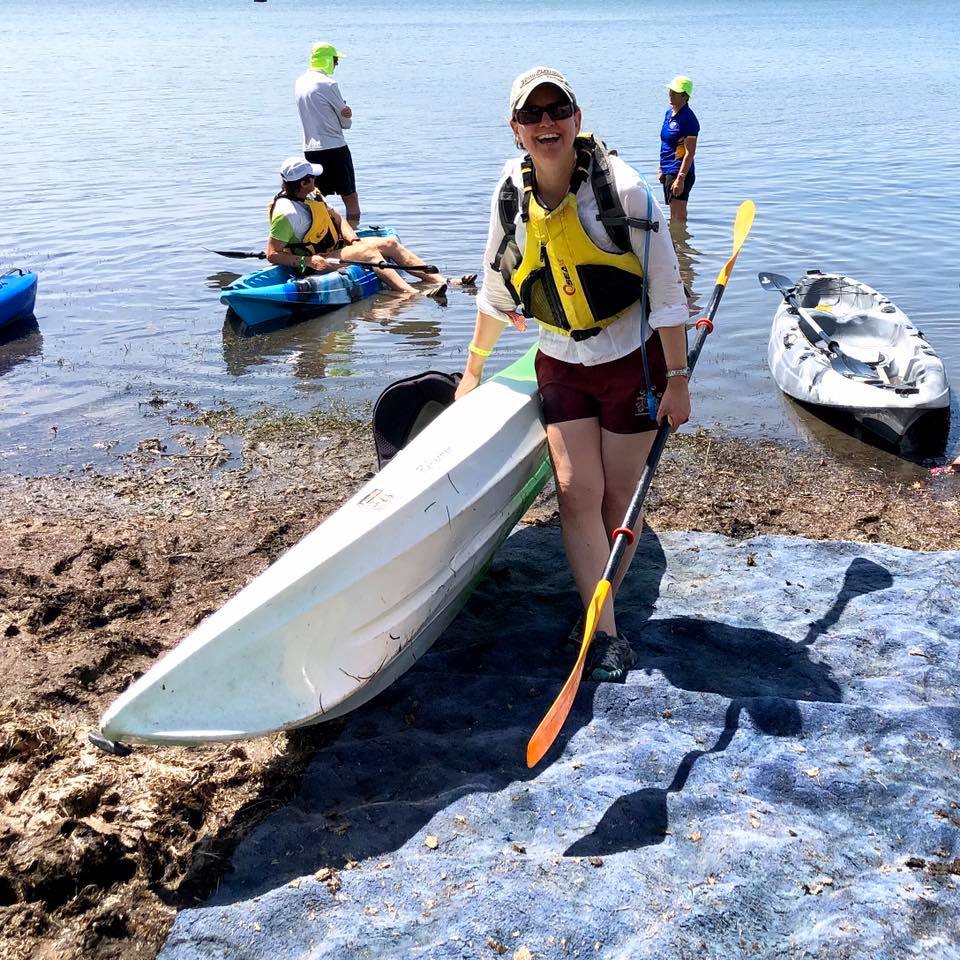
THE STATS
- 96 participants
- 18 doubles
- 58 singles
- 76 different paddle craft
- 20 volunteers
- 15 SES personnel + 4 boats
THE WINNERS
2 singles and 3 doubles cleared the course within the 3 hour limit most with less than 10 minutes to spare. Rob Bennett and Lachlan Bakewell completed the course in their double with a staggering 34 minutes to spare but were shattered to learn they had failed to properly register at CP 101. In a great show of sportsmanship (is there a gender neutral equivalent) doubles winners John and Mardi Barnes presented Rob and Lachlan with one of their matching doubles trophies (they also still had the energy to remain behind and assist with the pack-up … amazing). Steven Todkill was first back of the singles to clear the course and was also outright winner.
Full results can be found here.
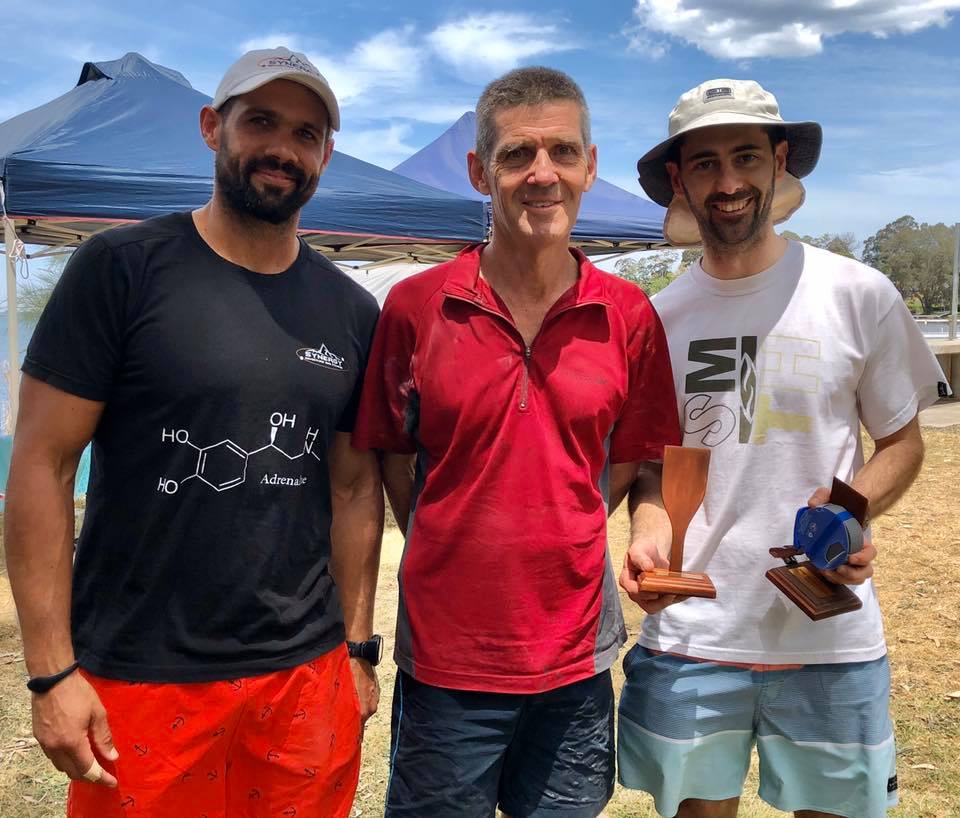
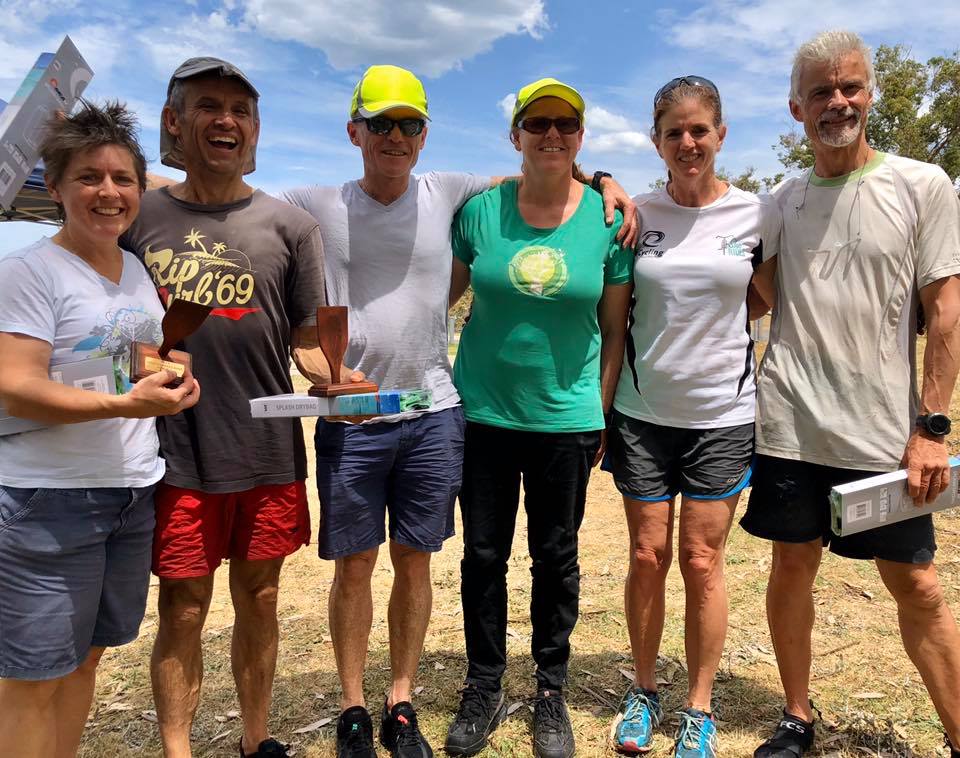
THE GRINNERS
While we were aghast at the low tide it seemed you participants took it in your stride … or should that be stroke. Feedback has been very positive to date especially from many of the first-timers. It’s pleasing to hear such positive responses since the day was really quite a blur for us and difficult to gauge. Smiling faces at the end gave us some indication that you had a good time and that most of you didn’t really mind getting a bit muddy. We’d love to hear your stories and anecdotes. I heard one girl lost a shoe while another person may have lost or broken their paddle. Feedback would be appreciated even critical if it is constructive and helps to prepare another even better Paddlegaine in the future. Will there be one? If there is would you recommend it to others? What would you do to improve it? Would you like to set the course or organise it? Do you know an area that would suit this style of event? I’m sure that the Rogaining committee will be interested in your thoughts about this event and will take them into consideration as to if or when another may be scheduled. It’s up to you really, if you want it, ask for it.
THE TEAM
We are very lucky to have the luxury of a wealth of navigational sports wisdom in our area. Our social environment is populated by many people who have planned and organised many major rogaines and orienteering events and we have sought ideas and assistance from many of these people. They were all generous with their time and we thank them for this. We are also lucky in that half the time we house the Newcastle Orienteering Club gear van at our home residence. Having this at hand saved us many hours of organising and sourcing equipment.
- Margaret Peel – Event Organiser – Course Planner – Checkpoint Placement & Collection
- Geoff Peel- Event Organiser – Course Planner – Checkpoint Placement & Collection
- Anita Bickle -Admin – Paddle Adviser – NavLight programming
- Carolyn Rigby – Admin
- Marg Cook – Paddle Adviser – Course Vetting – Checkpoint Placement & Collection
- Rob Cook – Paddle Adviser – Course Vetting – Checkpoint Placement & Collection
- Bob Gilbert – Transition – Presentations
- Denis Lyons – Transition Official – Checkpoint Collection
- Viola O’Connor – Transition
- Carolyn Chalmers – Transition
- Adrian Plaskitt – Car Parking – Catering
- Glenn Downey – Car Parking – Catering
- Bert Van Netten – Catering – Checkpoint Placement
- Maria Orr – Catering
- Peter Orr – Catering
- Neil Chappel – Car Parking – Catering – Checkpoint Collection
- Baxter Peel – Anchor testing – Soft Drink Spruiking
- Jack Hart – Checkpoint Collection
- Ann Montgomery – Checkpoint Collection
- Sam Howe – Checkpoint Collection
- Nicole Haigh – Council liaison
- Thomas Mackel – SES
Thanks to Lake Macquarie City for generously supporting this event.
(This report including many more photos is taken from the Paddlegaine Facebook page)